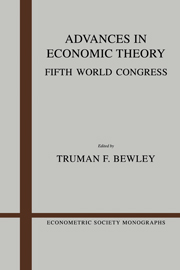Book contents
- Frontmatter
- 1 Auction theory
- 2 Game-theoretic analyses of trading processes
- 3 The theory of contracts
- 4 Battles for market share: incomplete information, aggressive strategic pricing, and competitive dynamics
- 5 A sequential strategic theory of bargaining
- 6 On the complexity of linear programming
- 7 Laboratory experimentation in economics
- 8 Increasing returns and the theory of international trade
- 9 Strategic aspects of trade policy
- 10 Equilibrium without an auctioneer
- 11 Arrow-Debreu programs as microfoundations of macroeconomics
2 - Game-theoretic analyses of trading processes
Published online by Cambridge University Press: 05 January 2013
- Frontmatter
- 1 Auction theory
- 2 Game-theoretic analyses of trading processes
- 3 The theory of contracts
- 4 Battles for market share: incomplete information, aggressive strategic pricing, and competitive dynamics
- 5 A sequential strategic theory of bargaining
- 6 On the complexity of linear programming
- 7 Laboratory experimentation in economics
- 8 Increasing returns and the theory of international trade
- 9 Strategic aspects of trade policy
- 10 Equilibrium without an auctioneer
- 11 Arrow-Debreu programs as microfoundations of macroeconomics
Summary
Abstract: Three topics are discussed. The first is a research program to establish whether the familiar trading rules, such as sealed-bid and oral double auctions, are incentive efficient over a wide class of economic environments. The second is a review of recent studies of dynamic trading processes, and particularly the effects of impatience and private information on the timing and terms of trade; the main emphasis is on models of bilateral bargaining. The third considers prospects for embedding bargaining and auction models in larger environments so as to endogenize traders' impatience as a consequence of competitive pressures; models of dispersed matching and bargaining and a model of oral bid-ask markets are mentioned.
Introduction
My aim in this chapter is to describe some developments in the theory of exchange. The topics I describe share a common focus, namely the determination of the terms of trade. They also share a common methodology: the application of game theory to finely detailed models of trading processes. The aim of this work is to establish substantially complete analyses of markets taking account of agents' strategic behavior. Typically the results enable two key comparisons. One is the effect of altering the trading rules, and the other is the effect of alterations in the environment, such as changes in the number, endowments, preferences or information of the participants.
- Type
- Chapter
- Information
- Advances in Economic TheoryFifth World Congress, pp. 33 - 70Publisher: Cambridge University PressPrint publication year: 1987
- 146
- Cited by



